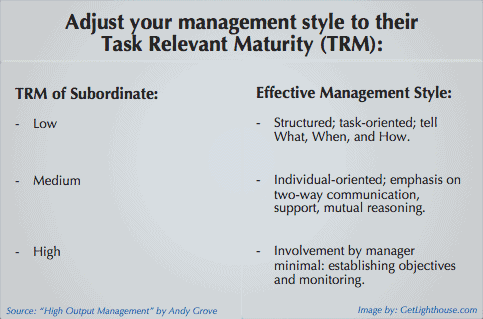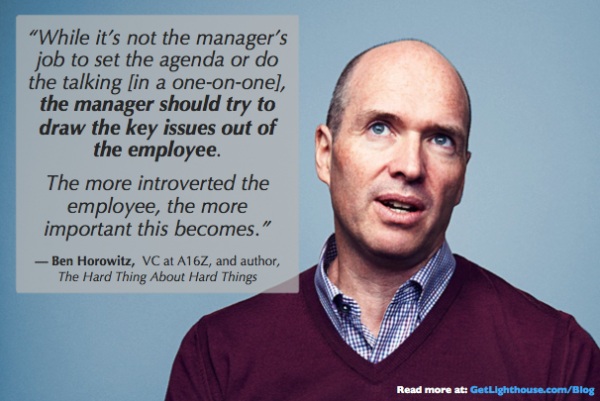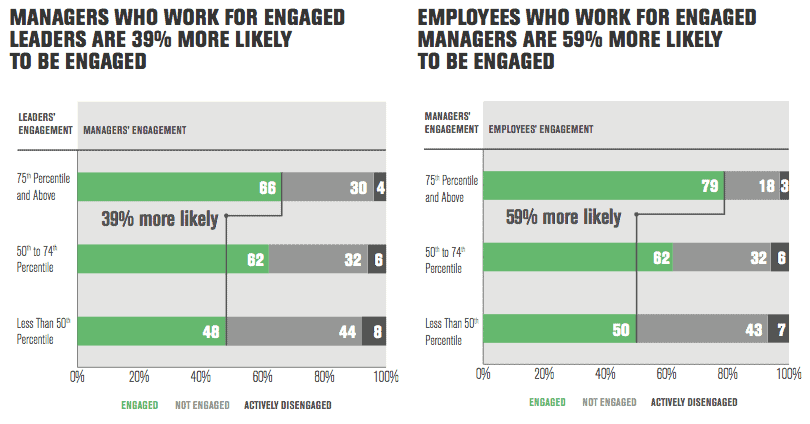Do you struggle with what questions to you ask your manager during your one on ones? What do you talk about in your one on ones? What about one on ones with managers that report to you?
It's important to understand that your one on ones– with individual contributors reporting to you– should be treated differently from those you'd have with the managers under you, and even moreso with the one on ones you have with your boss.
No matter the vantage point, one on ones helps you thrive at work and build and maintain great working relationships with your colleagues. That’s why it’s crucial to know which questions to ask your manager during your one on ones. Every type of one on one is unique, though, with different topics to discuss and questions you should ask to make the most of them.
Whether you're an aspiring manager looking to manage up and want to make a career move into leadership, a senior leader wanting to better manage your team of managers, or a hungry learner wanting to learn more about both, this post is for you.
The post below is broken up into 2 sections:
Click on either of them or their related question subsections to jump to the part that applies most to your situation:
- Questions to ask your manager in one on ones, including tips to help you manage up
- Questions to ask in one on ones with the managers under you to help you better support them
- Questions to ask about the Multiplier Mindset
- Questions to ask how things are going with their team?
- Questions to ask about resources they need & how they perceive you
- Questions to ask how they're feeling?
- Questions to ask about how they manage & grow their people
- Questions to talk about handling change
- Questions to talk about managing up to you
- Further reading
First, we'll dive into questions to ask in one on ones with your boss to help you better manage up.

Part 1: 23 Questions to Ask Your Boss During One on Ones
Having effective one on one meetings with your boss is important for a number of reasons. They can help you:
- Get feedback on what you need to improve
- Receive coaching in areas you're working to grow
- Strengthen your rapport with your boss, improving communication and reducing potential issues
- Offer your ideas and suggestions to improve your team, and how you work
- Avoid surprises and ensure you get good news at performance review time
And that's just the beginning. As former Intel CEO Andy Grove put it, regular one on ones can offer more than a 10x return on your time invested in them:

These meetings are a priceless opportunity. It’s crucial to know which questions to ask your manager during them. When else do you have the undivided attention of your manager, and have them solely focused on you? Chances are, this is the only time.
Whether your manager is taking advantage of your regular one on ones with you or not, with the right set of questions to ask your manager, you have the power to take charge of your one on one meetings.
If you're not getting what you want out of them, then bring some of your own agenda items and questions to change that.
You can create that 10X return just as much as your manager can.
Here are questions to ask your manager to make the most out of your one on ones, and get them more engaged in supporting you:

1) Questions to help you take charge of your one on ones
Most managers have good intentions. Unfortunately, whether overworked, overwhelmed, or just figuring things out for the first time, they don't always have everything perfect for you and your 1 on 1s. It’s therefor up to you to decipher exactly which questions to ask your manager to get the most out of your meetings.
The first place to start is if your manager isn't being consistent with your one on ones. After all, if they're not happening, there's no benefit to be gained.
Use a question like this to get your manager to reschedule the next time they try to cancel a one on one:
- 1) "Okay. I understand you have something pressing, and these meetings are important to me. When can we reschedule our 1 on 1 meeting to?"
This kind of response is useful for three reasons:
- You're building reciprocity by agreeing to their request, then asking for a favor.
- You're using "and” instead of "but” which helps build on the conversation instead of making it seem like you're disagreeing.
- You're immediately requesting a rescheduled time, making them less likely to forget, or put it off.
To make this even more effective, be prepared to suggest some new times for them to choose from. You can even bring up your calendar if you're talking in person.
Your goal is to make it as easy as possible to reschedule right away and avoid missed conversations from canceled one on ones.
Key questions to help you take charge of your one on ones
There's a lot more you can do than just make sure your manager sticks to your one on ones.
With specific key questions to ask your manager during your one on one meetings, you can influence what's talked about, what you get out of each meeting, and whether action is taken on what you cover. You may wish your manager would take charge, but that's no excuse to keep having wasted meetings.
Here are some more questions to ask your manager to help lead your one on one meetings with better results and outcomes:
- 2) To get Status Updates out of your 1 on 1s: How can I best give you updates at another time? How about an email, a chat message, or a few minutes in [team meeting X]?
- 3) For Career Advice: What skills do you think are most important for me to work on right now to help me advance?
- 4) I'd like to build a plan for my development. What do you see as important steps for me?
- 5) To encourage note taking: Would you like me to write that down for you, or send you a note later about it?
- 6) To ensure progress happens: What do you think we can both do for next time based on what we talked about? (Lean more about the Progress Principle here. )

2) Questions for managing up
What does your manager think of you? How can you manage up effectively, so you reduce the chance of having problems with them?
Or, even better, how can you strengthen your relationship with your manager?
Knowing how to effectively manage up is an important part of taking charge of your career; the relationship you have with your manager impacts everything from the projects you are assigned, the recognition you receive, your compensation, and promotions and new opportunities.

Leadership coach and Vistage Chair Beth Armknecht Miller says that the relationship you have with your managers can transform your career:
"Over the years, I have had the opportunity to coach many rising stars on their relationship with their manager, which is often the most critical to their success in an organization.”
Miller says there are three key elements to effectively managing up:
1) Know your boss's priorities and goals. When you know his/her priorities, you can tailor the information you share during meetings and conversations with them. And when you are able to assist your manager in accomplishing his/her goals, you are demonstrating you are dependable and take initiative, two highly coveted traits managers look for in their employees.
2) Anticipate the needs of your manager. The more you anticipate their needs and demonstrate your understanding of them, the more confidence and influence you will build with your manager. They'll trust you more and more.
3) Talk like your manager. Use the language and terms that he or she often uses, and focus on the topics that are most important to him/her. This aligns you and them to achieve goals for both of you.
One on one meetings with your boss are the perfect place to do all three of these things.
With the right questions to ask your manager, you can uncover their priorities, goals, needs, and their language and communication style. This helps you succeed in your career and becomes information you can use to improve your relationship with your manager.
Questions to ask your manager for uncovering their needs, goals, and language
By asking the right questions, you can discover all kinds of useful information to better understand and work with your manager.
Here are questions to ask your manager to better manage up:
- 7) What are your priorities? What wins do you need? (Uncover your manager's goals and priorities, which could be different than yours.)
- 8) What parts of my work are most important for you to be up to date on often? Where do you trust my work and I can be more autonomous?
- 9) What causes you to feel stressed about my work? What gives you confidence?
- 10) What have team members that frustrated you or were challenging to work with done or failed to do? (Avoid these things to keep your manager happy with your work.)
And questions to ask your manager to help you anticipate their needs:
- 11) Would X be helpful for you? How would you change it? (Great if you have an idea to help you or the team)
- 12) What do you recommend I do when I get stuck on [area you're weaker in]? (What do they want you to do when you get stuck? Also a great way to get them to coach you)
- 13) If I need help with something, what's the best way to get your input or support? (Useful if they have a hands-off management style and for finding out how they want you to go about getting input/support from them)
- 14) What’s the best way to approach you when I have an idea I’d like to discuss with you?
Listen carefully to what they have to say, and practice active listening skills to ensure you understand them. In many cases, the requests they'll make will be totally reasonable and just as easy to do as the other way you might have planned to do things.
Further reading:
Looking for more questions to ask your manager during your valuable 1 on 1s? Want to further tune up your 1 on 1s, and get better at managing up? Here's where to start:
- Learn how you can improve one on one meetings with your manager: 7 Essential Tips for Effective 1 on 1 Meetings with Your Manager
- Some of our best Advice for Managing Up at Work from Experienced Leaders
- If you liked the above questions, here are 18 Questions to Ask Your Manager to Improve Your Relationship and Better Manage Up

3) Questions to ask your manager to drive your career growth
Improving the relationship you have with your manager is one of the most important elements for your career growth.
Thanks to the law of reciprocity (if you do something for me, I'm more likely to do something for you), if you're helping your manager out in a few ways, they'll be more likely to want to help you.
Fortunately, most managers aren't like Dilbert's boss. They have your best interest in mind, and want to help you succeed. However, they are unlikely to have your career top of mind nearly as much as you do.

You need to show it's important to you and keep it top of mind for them.
With the right questions to ask your manager in your 1 on 1s, you can open up your career to grow in a variety of ways. Like the other questions we've discussed today, your initiative to ask about your career growth can help get the ball rolling towards many positive results for you.
- 15) What are the most important areas I need to master to get promoted here?
- 16) What skills gaps do you feel I have? (Remember: your manager is the person who will have to advocate for your advancement, so their opinion matters a lot.)
- 17) What kinds of milestones do I need to hit?
- 18) What are key habits you feel make someone successful in [your new role/ the role you want next]?
- 19) Can you help me get approval / or do you have budget for X? I think it will help me grow because.... (Talk about getting a book, a course, conference, etc. that will help you in your career)
- 20) What would it take for you to feel I'm ready for [desired role/promotion]?
- 21) What do you feel are my strengths? How could those help the team more and help me advance in my career? (More on the value of focusing on your strengths here)
- 22) What are some of the biggest mistakes I need to avoid at this point in my career?
- 23) Who were some of your biggest role-models and people you looked up to early in your career? Why?

Checking in on your progress
A conversation is only the beginning. Once you've established what you need to work on, and where you're heading, you need to make progress on it regularly.
As you begin making progress, these are the perfect questions to ask your manager to check in with your manager to see how you're doing along the way:
- 24) Do you feel my skills are improving in the areas we identified I need to work on?
- 25) What are the biggest barriers I still have to [the next promotion, raise, goal you're working towards]?
- 26) What would make you feel totally ready to advocate for me?
- 27) What is the #1 thing I can do to keep improving in [your biggest area of weakness you and your manager are working on]?
Some of these questions can be scary. You may not love what you hear, but it will get the elephants out of the room. If there's a weakness your manager sees or something holding you back, you need to know.

It's much better to hear these things on a Tuesday afternoon mid-quarter than it is to have a big surprise at the end of the year. By then, you want to have made progress and fixed those issues.
Being brave and taking charge of your career is how you advance faster. It also demonstrates to your manager you're serious about your career.
Asking tough questions and really listening to your manager is the best way to make sure the effort you put in is noticed and headed in the right direction.
Further reading:
No one cares more about your career than you. If you want to learn more about developing your career, and how to help others do the same, check out these posts:
- More on driving your own career growth
- An option to consider if your company doesn't have many promotions is to look at these ideas: Employee Development: How to grow your employees when you can't promote them
- What to do if you can't figure out what your goals are: How to help when your team member can't answer "What are your career goals?”
- Think about your career by asking yourself these questions we encourage managers to ask their teams: How to Help Your Team Achieve Their Goals

4) Questions to Ask Your Manager if They’re the CEO
If your manager is the CEO of your company, or you get the chance to meet your company’s CEO for another reason, asking them the right questions can give you invaluable insights you couldn’t have gotten anywhere else.
They’ll have a unique, and important perspective on many things, including your company’s future and plans for growth. They’re the final decision maker and vision setter for the company, after all.
Your company’s CEO will also be able to give you tips on how you can grow, especially if you want to become an executive leader yourself one day.
Here’s some key questions to ask your CEO in the limited time you have meeting with them:
Questions about developments plans for the company
One of the best topics to discuss with your CEO is the future of your company. How they think about the company’s future prospects and growth are major indicators of what you can expect in the short- and long-term.
How are they thinking about organizational structure? What do they look for in future leaders? What’s their plan for scaling up? You can find out by asking them the following and similar questions:
28) How do you think our org structure will be different in 6-12 months compared to now?
29) What are the most important milestones our company needs to hit in the next year? What happens if we do or do not hit them?
30) How do you think about the design of our organization? What are the most important guiding principles in your opinion?
Asking questions like these will help you understand your company’s biggest priorities are, and how your company may be changing in the coming months and years. And all of this will be coming straight from the most important decision maker.
Further reading:
- Why a Flat Organizational Structure will Fail as You Grow, a blog you can share with them to learn from and avoid the mistakes of companies such as Zappos, Medium, and Buffer
- Why everything breaks at 25 employees, which is all about the growing pains growing companies go through at that size.

Questions about your growth and learning opportunities
Meeting with your CEO is the perfect opportunity to understand career growth opportunities at your company. This is important for your own career development as well as that of your team.
For you personally, it helps you chart out a career development plan and take concrete next steps for achieving your ambitions.
For your team, it makes it easier to motivate them as you’ll be able to tell them exactly what’s expected of them to level up in their career and who to talk to to make that happen.
To find out how your CEO supports the development of their employees, ask them the following questions:
31) How much do you look to promote from within vs. hiring external senior leaders?
32) What qualities do you look for in potential internal promotions?
33) What is your philosophy on employee growth and development?
33) How should the company and managers like me support the growth of our teams?
34) What is your approach to budgeting for things like employee growth?
35) For high potential people on my team, what do you think is the best way to make sure we keep them in mind for future roles and opportunities?
36) How do you see me fitting into the future growth of the company? (best to ask if you work close enough to them for them to know you and your work well)
With these questions, you’ll have a clear understanding of how you and your team can progress in your career and what the company is doing (not going to do) to support you.
Further reading:
- Learn The Top 10 Reasons Companies Fail at Promoting from Within
- And if you need to convert your CEO to believe more in internal promotions, consider this post: Why you should promote from within and how to do it well
Questions about the CEO’s career that can help you
If your aim is to become an executive one day, meeting with your CEO will be a goldmine of opportunities to learn how. In most cases, it’s taken them years or even decades to get to where they are today.
That’s why they’ll be able to tell you what skills to work on specifically and what mistakes to avoid as you work on your own development.
In my first job after graduating college, I cold-emailed the CEO of the company I was working at asking to meet with him and ask questions about entrepreneurship. Amazingly, he replied and spent over an hour with me sharing advice I still follow to this day.
You may be surprised how open most CEOs will be to giving you advice if you simply ask them the right questions. These can include:
37) How did you get to the role you’re in today?
38) What advice would you have for someone interested in an executive role one day?
39) What’s the most challenging aspect of working in an executive role? Why?
40) What’s the biggest misconception about being an executive?
41) What are the most important skills I should focus on to eventually reach a role like yours?
42) What’s the biggest mistake you see someone make who is trying to go from where I am today to an executive role?
Do you know someone you could introduce me to that could give more advice to me on this long term career goal? (Especially helpful if you want a different C level role than CEO; they probably know some CMOs, CTOs, etc)
1:1s with your CEO can supercharge your growth. They’re a way to get years worth of experience in hours if you ask the right questions.
If you want to learn more about how to get CEOs to open up, check out these posts:
- Questions to Ask Your CEO in Three Different Scenarios, including ways to build rapport with them and what to ask in Town Hall meetings
- If you’re considering joining a new company, here’s how you can tell if a CEO is focused on building a healthy company culture

Part 2: 60 Questions to Ask Your Managers during One on Ones
When you're at the level in an organization where you manage others who also manage teams, your impact is exponential; not only do your efforts improve or hurt your team, but it trickles down to their teams as well.
Gallup calls this the "Cascade Effect":
Unfortunately, many leaders make the mistake of not checking in regularly with those on their team that are managers. That's a huge mistake.
As you can see in the chart, a disengaged manager will cause their team to disengage, too. That can get very expensive fast both in lost productivity and lots of turnover.

Support your managers with regular one on ones
Just because someone was promoted does not mean you can give them less support. In fact, they need more help and guidance from you.
When you abandon your people right when their Task Relevant Maturity is at its lowest, you crush their morale, and hurt they and their team's ability to succeed. You can do better.

The best way to help your managers is to keep your regular one on ones with them. The questions to ask in one on ones with them may change, but the importance of the meetings does not.
If anything, one on ones become more important.
You and your managers' time is precious. Don't waste your one on ones with them on status updates. These one on one meeting questions to ask a manager under you can help you get to the root of key issues that can have an out-sized impact for your managers and their teams.
[Ed Note: If you're looking for questions to ask in one on ones with an individual contributor, these 1 on 1 Meeting Questions Great Managers ask Their Teams can help.]
Questions to ask your managers about the Multiplier Mindset
Being a multiplier (or in your case exponential) is a key mindset to have as a leader. You have the ability to improve the performance of everyone you manage, which compounds quickly.
Your managers have the same potential.
These questions to ask in one on ones with managers will help you explore the multiplier mindset with them. By asking them, you will ensure that they have the right habits and are thinking about how to be multipliers themselves.
- 1) What's one thing we could do for you to help improve the performance of your team?
- 2) What's the biggest thing preventing your team from getting more done, or done better?
- 3) How much time do you spend in meetings? Are there any you don't feel you need to attend?
- 4) How much time are you spending on individual work? What about managing? (Are they investing enough in their team?)
- 5) If we had budget to get you any one thing for you to make you better at your job, what would you want?
- 6) If we had budget for any one thing for your team to be more effective, what would you want?
- 7) Am I available to support you when you need it? What is a recent example that comes to mind? (Explore this and do more of what they liked, or find out what you can do differently)
- 8) In what areas of your work would you like my help with deciding what you can or can’t delegate?
- 9) What tasks can you delegate to someone else that would allow you to focus on making your team more productive?
These questions can help you think about how you can improve your team of managers, which means making a change that helps a whole group of people be more effective.
You may be surprised what a few small changes can do to improve things for your managers and their teams. By asking them these questions, you'll get them thinking about the big picture, and out of their day to day hustling.

Questions to ask your managers how things are going with their team?
Unfortunately, work isn't all sunshine and rainbows. There are conflicts. People can burn out. Valued staff can become bored. Turnover can spike, or morale can plummet after an unpopular decision.
These are all issues a manager must learn to deal with, and may want your advice on handling. Even better, they often can use your help in catching and fixing such problems before they become too big and devastating.
- 10) Who do you think is at risk of leaving the company? How could we save them?
- 11) Who are your top performers? Why them?
- 12) Do you feel everyone on your team is properly compensated based on their performance?
- 13) Who on your team is struggling right now? What tactics are you using to help them?
- 14) What's the best idea or suggestion you've heard from your team lately?
- 15) How do you solicit ideas and feedback from your team? How often?
- 16) What's one thing we should stop doing?
- 17) What's a recent situation where you'd like my advice on how to handle it now, or next time?
- 18) How did you think [situation] went? How could we improve that together?
- 19) How has [current event] affected your team members? What can we do to improve the situation for those impacted?
Fixing problems when they're small is one of the best ways to keep your managers out of reactivate management mode (aka- fire fighting). By asking these questions, you make it clear they can safely discuss issues with you before they're massive problems. You also get them thinking about exactly the kinds of things they should be doing and asking of their own teams.

Questions to ask your managers about resources they need & how they perceive you
With changing teams, and new goals, comes new challenges. What was the right mix of resources and support previously may not work now. The best way to find out is to ask. Whether it's a new team, or a manager you've worked with for a long time, these questions can give you fresh perspective:
- 20) What's one thing I could do to better support you?
- 21) What's the biggest bottleneck or blockers that affects you and your team doing their jobs well right now?
- 22) What would you change if you had my job? Why that?
- 23) What do you want to know about my job and responsibilities now?
- 24) What would you do to help the person replacing you if you had my job?
- 25) Is there anything in my job you feel you don't know that you should?
- 26) What should I change about how I communicate with you and your team? How would that help you?
Self awareness is hard. It's not always clear how much your managers understand about what you do.
Having an honest discussion about what they don't know about your job, and how you can better support them, can go a long way towards dispelling any myths, and strengthening your working relationship.
Sometimes this may be tough medicine to swallow. However, it's better to tackle these issues while you can fix them, than a manager losing a large portion of their team, and them being frustrated at you for a lack of support.
As things change at work, this can become a moving target. Consider revisiting these questions semi-regularly to see how what they need evolves.
Further reading:
- Recognizing a Great Senior Manager, where you'll learn 4 tell-tale Senior Manager Traits you can develop on your team
- 4 Ways You Can Fast Track Your Star Employee's Career, a comprehensive set of tips for making sure your best performer keeps thriving

Questions to ask your managers how they're feeling?
After initial excitement fades from a promotion, the real work begins. This isn't always easy for people, especially if they're new to management.
Asking a few questions about how they're really feeling can be a huge relief for them as they spend most of their time helping their team with their problems.
- 27) How is managing your team going for you?
- 28) How is your / your team's workload? Too little, too much, or the right amount?
- 29) How do you feel about your balance between doing individual work vs. managing? Do you feel like you're doing too much or too little of either?
- 30) What is your favorite part about being a manager? Why that?
- 31) What is your least favorite part about being a manager? How do you handle that?
- 32) What do you want to do next in your career? How can I help you get there?
- 33) Are you happy in this role? What could make it better for you?
- 34) If you could go back to your old job, would you want to? Why?
- 35) How do you feel your work/life balance is? What would you want to change, if anything?
- 36) Do you feel like there are too many distractions in your day-to-day work? How could you change that?
Sometimes the simplest questions are the most powerful. Making sure your managers are happy in their roles is a great way to ensure their teams are happy too.
No one benefits from working for someone who doesn't like their job. It's also why companies like Netflix make it safe for managers to return to individual contributor work if they decide they don't like managing anymore.

Questions to ask your managers about how they manage & grow their people
People leave managers not companies. A few key habits like regular one on ones, helping grow their people, and showing they care, can make all the difference in morale, motivation, and retention.
If you're developing managers on your team, it's important to make sure they're building and maintaining these habits with their teams, too. Of course, the example you set is one of the most important parts, and these questions to ask in one on ones with them can help as well:
- 37) How often are you having one on ones? Does that feel like the right frequency for everyone?
- 38) What has come up in your one on ones lately that I should know about, or you'd like help with?
- 39) When was the last time you praised each of your team members?
- 40) Anyone need performance improvement? Why?
- 41) Who is close or ready for promotion? For what roles?
- 42) Who are the best people on your team? What are they doing well?
- 43) How can we help your best people be more successful?
- 44) If you had to promote someone to [role x] who would you recommend and why?
- 45) Do you feel [team member x] is ready to advance? How can we work together to help them grow?
- 46) Who on your team do you feel has the most leadership potential? What can we do to help them develop leadership skills?
Identifying stars is a great way to ensure good people stick around. By supporting them and showing a path before you need them in a new role you avoid them looking for growth outside your company.
Meanwhile, dealing with underperforming employees can be a relief for a manager's entire team.
Further reading:
- Are you a New Manager? Here what you need to know to hit the ground running from Day 1.

Questions to talk about handling change
Not all change is popular. And even for changes that are welcomed, buy-in and long term success is no accident.
These questions can help navigate the broad objections and implementation issues from the front lines so they trickle up to leaders like you.
- 47) What do you and your team think of the recent changes?
- 48) What tweaks would you make to [change x] to help you and your team?
- 49) What are you and your team's biggest concerns about [change y]?
- 50) I'm thinking about making [change z], how long would it take to privately solicit feedback from your team on it?
- 51) Do you feel like we communicated change X properly? Why and what can we do to improve?
While ideally, you'll get some feedback on changes before a public announcement, that's not always possible. By checking in whenever you can about a change, you demonstrate you are listening, and care about what they think.
If you make adjustments based on valid feedback from your managers and their teams, this can be especially valued, and increase buy-in for you as a leader. This line of questions can also then provide you a forum to explain to your manager why a decision was made, which they can then selectively share as well.

Questions to talk about managing up to you
Your relationship with your team of managers is just as important as their relationship with their team members. However, it's easy for someone like you a few layers up to become buried in work and demands and lose sight of this.
Asking questions like these can help identify problems and opportunities for you and your managers to work better together. You can also use these to teach them how to better manage up to you:
- 52) Do you find it easy to communicate with me? What makes you feel that way?
- 53) What's one thing I could do to make things easier for you and your team to keep me informed?
- 54) What do I just not understand about you or your team that if I did, things would be better?
- 55) How often do you think is the right frequency for us to get on the same page?
- 56) How would you prefer to update me? (Work with them to balance this with your needs)
- 57) What do you think is fair for me to expect from you?
- 58) What do you think is fair for you to expect from me?
- 59) Do you feel like you understand my needs from you and your team?
- 60) Do you find it easy or difficult to manage my expectations? Why?
These questions on managing up can open a very healthy dialogue. Once you've heard their perspective, they're more likely to listen to and appreciate yours. Then, you can find the common ground needed to work better together.
By creating clear expectations and opening safe communication in your one on ones, you will help your managers be more successful in their role and specifically in working with you.
---
As a company grows, communication becomes more difficult. By investing in one on ones and asking the right questions, you can combat these challenges and ensure you focus your time on the highest impact areas to help your managers.
These 96 questions to ask in one on ones are a great place for you to start.
Want to document all of this in one location? Download our free 1:1 meeting template below.

Further reading
Whether you're looking to make the most of your relationship with your manager as an employee, or you're a senior leader who wants to help grow and develop the managers under you, we have additional guides to help.
Additional resources for managing up and working with your boss:
- 7 Essential Tips for Effective 1 on 1 Meetings with Your Manager
- 9 Expert Tips for Managing Up at Work from Real Leaders
- How to Get Status Updates Out of Your 1 on 1s (and what to focus on instead)
Additional resources if you're a senior leader who wants to know how to develop your managers and become a better leader:
- 12 Questions to ask Your Team to Become a Better Coach at Work
- 15 Skills Senior Leaders Must Master
- How to Use Skip Level 1 on 1s to Majorly Improve Your Managers as a Senior Leader
- Leading Happy Teams: 5 Ways to Keep Your Team Happy in a Recession
- How to Coach Employees
Are you and your managers wasting their 1 on 1s?
There is no greater investment to make in your team than having 1 on 1s. Yet, done poorly they’re a huge waste of time.
That’s why we made the 1 on 1 Master Class. You and your fellow managers learn step by step how to supercharge these meetings to motivate your teams, fix problems, coach your people, and much more.
You can learn how Lighthouse Lessons can help your leaders like we helped SeedBox Technologies by signing up here.






